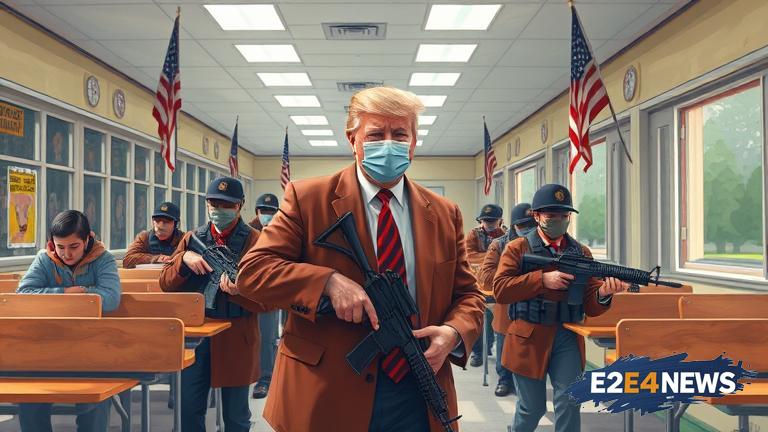The new school year has begun in Washington state, but the return to classes has been marred by controversy over the presence of armed patrols on school grounds. The policy, introduced by the Trump administration, has left many parents on edge, with some expressing concerns about the safety and well-being of their children. The armed patrols, which are comprised of local law enforcement officers, are intended to provide an additional layer of security in the wake of recent school shootings. However, many parents and educators have questioned the effectiveness of this approach, arguing that it may actually create a more hostile and intimidating environment for students. Some have also raised concerns about the potential for racial profiling and the impact on students from diverse backgrounds. Despite these concerns, the Trump administration has pushed forward with the policy, citing the need to protect students from potential threats. The move has been met with resistance from some school districts, which have opted out of the program citing concerns about the potential risks and liabilities. In Washington state, several school districts have decided to participate in the program, with some parents expressing support for the added security measures. However, others have been vocal in their opposition, arguing that the presence of armed patrols will create a culture of fear and mistrust. The controversy has sparked a wider debate about the role of law enforcement in schools and the impact on student safety and well-being. Some experts have argued that the presence of armed patrols can actually exacerbate the problem of school violence, rather than preventing it. Others have pointed to the need for more comprehensive and nuanced approaches to school safety, including increased funding for mental health services and social support programs. The issue has also raised questions about the balance between school safety and student privacy, with some arguing that the presence of armed patrols may infringe on students’ rights to a safe and supportive learning environment. As the school year progresses, it remains to be seen how the policy will play out in Washington state and other parts of the country. One thing is certain, however: the debate over armed patrols in schools is far from over, and it will likely continue to be a contentious issue in the months and years to come. The policy has also sparked concerns about the potential for police brutality and the impact on students from marginalized communities. Some have argued that the presence of armed patrols will disproportionately affect students of color, who are already more likely to be subject to disciplinary action and police violence. The controversy has also highlighted the need for greater transparency and accountability in school safety policies, with some calling for more robust oversight and community engagement. In response to the concerns, some school districts have established protocols for reporting incidents involving armed patrols, and have pledged to provide additional training for officers on issues such as diversity and inclusion. However, others have criticized these measures as inadequate, arguing that they do not go far enough to address the underlying issues. The debate over armed patrols in schools is a complex and multifaceted one, with no easy answers or solutions. As the country continues to grapple with the issue of school safety, it is clear that a more nuanced and comprehensive approach is needed, one that takes into account the diverse needs and perspectives of students, parents, and educators. The Trump administration’s policy has been widely criticized by educators and advocacy groups, who argue that it is a misguided and ineffective approach to school safety. Some have pointed to the need for more evidence-based approaches, including increased funding for school counseling and mental health services. Others have argued that the policy is a form of ‘security theater,’ designed to provide a false sense of security rather than actually addressing the root causes of school violence. As the debate continues, it is clear that the issue of armed patrols in schools will remain a contentious and highly politicized one, with significant implications for the safety and well-being of students across the country.
